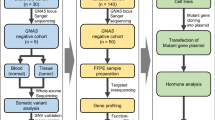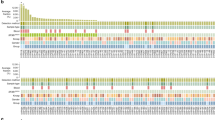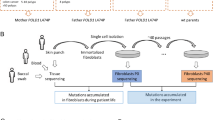Abstract
Pituitary tumours develop at a high frequency in p27-knockout mice and retinoblastoma gene-knockout mice, which suggests that cell cycle regulatory genes, such as cyclin-dependent kinase inhibitor genes, are involved in the tumorigenesis of pituitary adenoma. Analysis of p21 and p27 gene abnormalities in human pituitary adenoma was performed in 28 pituitary adenomas by polymerase chain reaction-single-strand conformational polymorphism. No point mutations were detected in these genes. As no abnormalities of the p21 and p27genes were observed, and if these genes are indeed inactivated, it is likely to be via transcriptional or translational defects.
This is a preview of subscription content, access via your institution
Access options
Subscribe to this journal
Receive 24 print issues and online access
$259.00 per year
only $10.79 per issue
Buy this article
- Purchase on Springer Link
- Instant access to full article PDF
Prices may be subject to local taxes which are calculated during checkout
Similar content being viewed by others
Author information
Authors and Affiliations
Rights and permissions
About this article
Cite this article
Ikeda, H., Yoshimoto, T. & Shida, N. Molecular analysis of p21 and p27 genes in human pituitary adenomas. Br J Cancer 76, 1119–1123 (1997). https://doi.org/10.1038/bjc.1997.521
Issue Date:
DOI: https://doi.org/10.1038/bjc.1997.521
This article is cited by
-
P21Waf1/Cip1 and p27Kip1 are correlated with the development and invasion of prolactinoma
Journal of Neuro-Oncology (2018)
-
Promoter hypermethylation profile of cell cycle regulator genes in pituitary adenomas
Journal of Neuro-Oncology (2007)
-
Mutational analysis of transforming growth factor-beta receptor type II and Smad3 tumor suppressor genes in prolactinomas
Brain Tumor Pathology (2006)
-
Infrequent mutation of APC, AXIN1, and GSK3B in human pituitary adenomas with abnormal accumulation of CTNNB1
Journal of Neuro-Oncology (2005)
-
Aggressive vestibular schwannomas showing postoperative rapid growth – their association with decreased p27 expression
Journal of Neuro-Oncology (2005)



